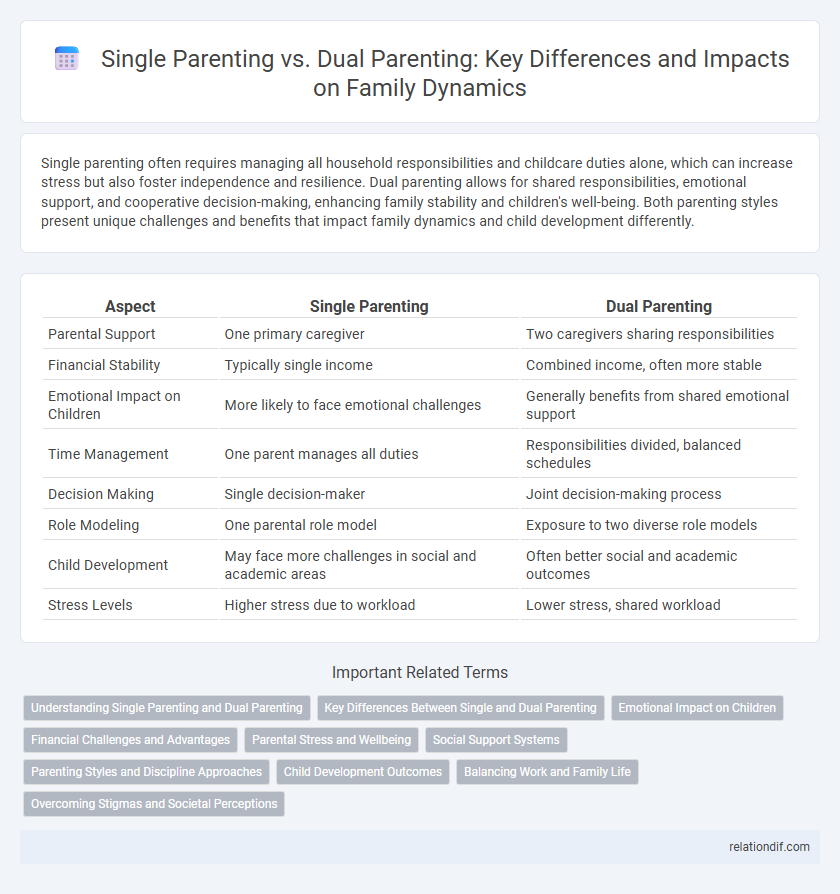Single parenting often requires managing all household responsibilities and childcare duties alone, which can increase stress but also foster independence and resilience. Dual parenting allows for shared responsibilities, emotional support, and cooperative decision-making, enhancing family stability and children's well-being. Both parenting styles present unique challenges and benefits that impact family dynamics and child development differently.
Table of Comparison
| Aspect | Single Parenting | Dual Parenting |
|---|---|---|
| Parental Support | One primary caregiver | Two caregivers sharing responsibilities |
| Financial Stability | Typically single income | Combined income, often more stable |
| Emotional Impact on Children | More likely to face emotional challenges | Generally benefits from shared emotional support |
| Time Management | One parent manages all duties | Responsibilities divided, balanced schedules |
| Decision Making | Single decision-maker | Joint decision-making process |
| Role Modeling | One parental role model | Exposure to two diverse role models |
| Child Development | May face more challenges in social and academic areas | Often better social and academic outcomes |
| Stress Levels | Higher stress due to workload | Lower stress, shared workload |
Understanding Single Parenting and Dual Parenting
Single parenting involves one adult assuming the primary responsibility for child-rearing, often balancing work, finances, and emotional support independently. Dual parenting features two caregivers sharing parenting duties, offering complementary emotional and financial resources that benefit child development and family stability. Research indicates children in dual-parent households often experience enhanced social, academic, and psychological outcomes due to increased parental involvement and support structures.
Key Differences Between Single and Dual Parenting
Single parenting involves one individual fulfilling all caregiving and decision-making responsibilities, often leading to increased stress and time management challenges. Dual parenting distributes responsibilities between two caregivers, providing emotional support, shared financial resources, and diverse role modeling for children. Studies show children in dual-parent households typically benefit from more stability and social development opportunities compared to those in single-parent families.
Emotional Impact on Children
Single parenting often results in children experiencing heightened emotional challenges due to reduced parental availability and support. Dual parenting provides a balanced emotional environment, promoting stability and positive behavioral outcomes in children. Research indicates that consistent emotional nurturing from both parents significantly lowers risks of anxiety and depression in children.
Financial Challenges and Advantages
Single parenting often faces significant financial challenges due to relying on a single income, which can limit resources for housing, childcare, and education. Dual parenting typically benefits from combined incomes and shared expenses, providing greater financial stability and the ability to invest in long-term family goals. Budgeting and financial planning differ markedly between single and dual parenting households, impacting economic resilience and lifestyle choices.
Parental Stress and Wellbeing
Single parenting often results in higher parental stress due to increased responsibilities and limited support, negatively impacting wellbeing. Dual parenting typically allows for shared duties, reducing individual stress levels and promoting better mental health outcomes. Studies show cooperative parenting contributes to greater resilience and emotional stability for both parents and children.
Social Support Systems
Single parenting often faces challenges due to limited access to social support systems compared to dual parenting, where two caregivers can share responsibilities and resources. Dual parenting typically benefits from broader family networks and community involvement, which provide emotional and practical assistance essential for child development. Access to social support systems significantly impacts the well-being and resilience of families, influencing both parenting effectiveness and children's social outcomes.
Parenting Styles and Discipline Approaches
Single parenting often emphasizes flexible, adaptable discipline approaches tailored to the child's immediate needs, fostering strong individual bonds and consistency in rules. Dual parenting typically allows for the integration of diverse parenting styles, such as authoritative and permissive, promoting balanced discipline strategies and shared responsibility for maintaining structure. The dynamic between cooperative decision-making and consistent enforcement in dual-parent families often results in comprehensive behavioral guidance and emotional support.
Child Development Outcomes
Children raised in dual-parent households generally exhibit better emotional stability, higher academic achievement, and stronger social skills compared to those in single-parent families. Single parenting can present challenges such as reduced time for supervision and emotional support, potentially impacting cognitive and behavioral development. Supportive co-parenting strategies and community resources can mitigate risks and promote positive child development outcomes across family structures.
Balancing Work and Family Life
Single parenting often requires juggling multiple responsibilities independently, making time management essential to balance work and family life effectively. Dual parenting provides opportunities for shared household duties and child-rearing tasks, which can alleviate stress and improve work-life integration. Research indicates that cooperative parenting supports emotional stability for children and enhances the overall well-being of the family unit.
Overcoming Stigmas and Societal Perceptions
Single parenting often faces societal stigmas rooted in outdated perceptions of family structure, yet many single parents demonstrate resilience and provide stable, nurturing environments. Dual parenting is frequently idealized, but the quality of parenting and emotional support matters more than family configuration. Society benefits from embracing diverse family models, recognizing that love, stability, and effective parenting transcend traditional norms.
single parenting vs dual parenting Infographic

 relationdif.com
relationdif.com